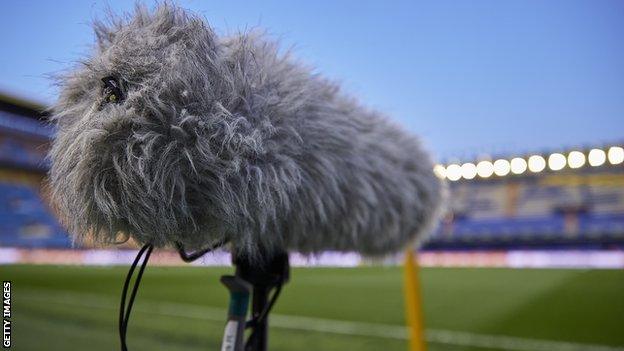Football commentators must address racial 'bias' says PFA
- Published

Live TV commentaries from top-flight games in England, France, Spain and Italy were analysed
There is "evident bias" in some football commentary relating to the skin tone of players, according to a new study.
In 80 televised games analysed across four European leagues, including the Premier League, players with a lighter skin tone were praised more often for their intelligence and work ethic.
Meanwhile, those with darker skin tones were "significantly" more likely to be "reduced to their physical characteristics or athletic ability", such as their pace and power.
The research, external, conducted by Danish firm RunRepeat in association with the Professional Footballers' Association (PFA), concluded that the findings showed "bias from commentators".
"The continuous praise for players with lighter skin tone for their skill level, leadership and cognitive abilities combined with the continuous criticism for players with darker skin tone is likely to influence the perception of the soccer watching public," said the researchers.
PFA equalities executive Jason Lee told BBC Sport: "It was always important to collate information rather than just speaking about the fact we believe there is unconscious bias within sport, and across society really.
"If you're describing two types of players, one is white and one is black, and they are both doing exactly the same thing and yet for the black player you are picking up on the negative side of it and for the white player it's the positive side, what I mean by that is a black player will be perceived as having pace and power and aggression, and a white player will have ingenuity and creativity and determination, different traits, when it could be the reverse."
This research comes amid pressure for the football industry to take clear steps to improving equality of opportunity and eliminating racial bias.
Lee added: "I think it's damaging in the long term because when players leave their playing career and they go into coaching or managing, or want to be seen in a more positive light, people will have already built up this perception because for 10 or 20 years all you've heard of is that person is quick, powerful and aggressive, and you've not heard they are actually intellectual, articulate and [have] a quite different set of skills."
We have to keep race conversation going - Deeney
How the research worked
The Racial Bias in Football Commentary study was based on English language live television commentary from 80 games during the 2019-20 season, split evenly between Italy's Serie A, France's Ligue 1, Spain's La Liga and the Premier League.
2,074 statements were analysed, which related to 643 unique players.
Rather than categorise players by race, they were coded according to their skin tone, using the database from the Football Manager 2020 video game.
Players were given a score from one to 20 according to skin tone and then designated as either "players with lighter skin tone" or "players with darker skin tone".
Comments were categorised as being positive or negative, and opinions were analysed rather than statements of fact, which were used as the control group to see if bias was evident.
Key findings
The study found that commentators were "6.59 times more likely to comment on the strength of a player with darker skin tone" and "3.38 times more likely to comment on the speed of a player with darker skin tone" than lighter-skinned players.
In relation to intelligence and work ethic, more than 60% of praise was aimed at players with a lighter skin tone.
There was also certain attributes that were brought up more often for those with darker skin tones, including form.
But the researchers found that "differences are most stark when commentators are discussing physical characteristics/athletic abilities".